Rebetiko: Greek blues from high atop the Aegean Sea
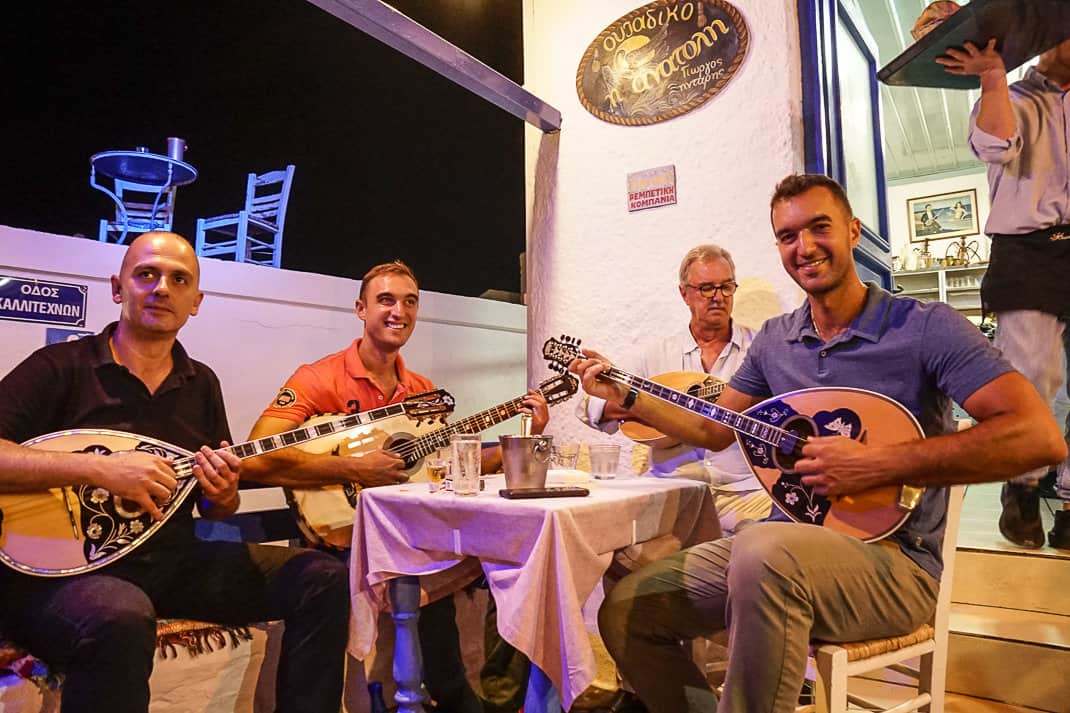
SKOPELOS TOWN, Greece – I haven’t been to a concert in a long time but I doubt any of you music mavens ever had a venue with the view I had two weeks ago. I was atop a high cliff in an outdoor restaurant surrounded by snow-white walls. A look over the edge gave me a panoramic view of the Aegean Sea, royal blue, crashing against the rocks below.
At this isolated spot – a good, brisk 15-minute hike straight up from Skopelos’ harbor – is one of Greece’s national centers for its most traditional music genre.
Rebetiko (re-BET-iko), also known as Green blues, dates back to the 15th century when Greece was part of the Ottoman Empire. Rebetiko songs were filled with themes of those oppressed under the Turks and post-independence Depression: drinking, drugs, crime, immigration, poverty, prostitution.

Sounds like my last balcony party.
Seriously, during a steaming morning during my week’s stay on the small island of Skopelos 90 miles (145 kilometers) north of Athens, I took the bus from the village of Panormos (pop. 50) into Skopelos Town to meet the godfather of Skopelos’ Rebetiko scene.
Giorgos Xintaris
Giorgos Xintaris, 70, was raised in Skopelos and listened to the old rebetiko singers around the island. Then he’d race home in order to memorize the lyrics and music. He moved to Athens when he was 14. He worked as a builder and played rebetiko in various local tavernas.
He has turned his passion into the hottest rebetiko spot on Skopelos and one of the best in Greece. His Ouzeri Anatoli restaurant plays rebetiko seven nights a week from the start of June to the middle of September.
Giorgos sat at a table with me and his son Theodore, who along with his brother, Antonis, play with their father at night. Giorgos is a tall, burly man with a full head of shocking gray hair and thick glasses. He looks the part of the aging folk singer, a legend in his own national genre.
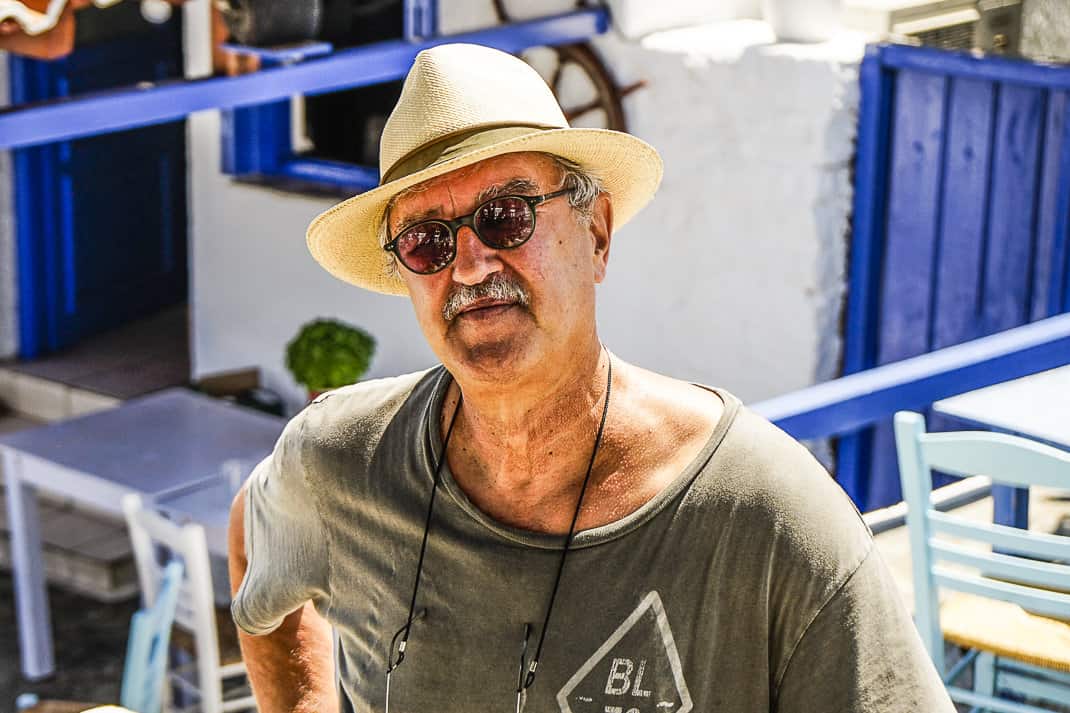
I asked him what he likes about rebetiko.
“Because rebetiko is true,” he said through Theodore, his translator. “It’s the true song. It has images. It has reality. It speaks directly to your heart. All these songs are so raw. They are honestly raw. These songs can penetrate everyone. You can’t find one song in rebetiko you can’t relate to.”
Rebetiko description
I am no music critic. The last concert I went to was the tone-deaf Beach Boys in Las Vegas in 1989. But before my trip I listened to some old – very old – tapes, such as these: rebetiko tapes.
Without having a clue what they were saying, it did make me feel as if I was in a Greek taverna, even while sitting in my living room in Rome.
The sound is a bit scratchy and not just because the artists were from the 1920s, ‘30s and ‘40s. Yet listening to some of the legendary singers such as Markos Vanvakaris, Roza Eskanezi and Sotiria Bellou, even a musical moron like me could feel the emotion.
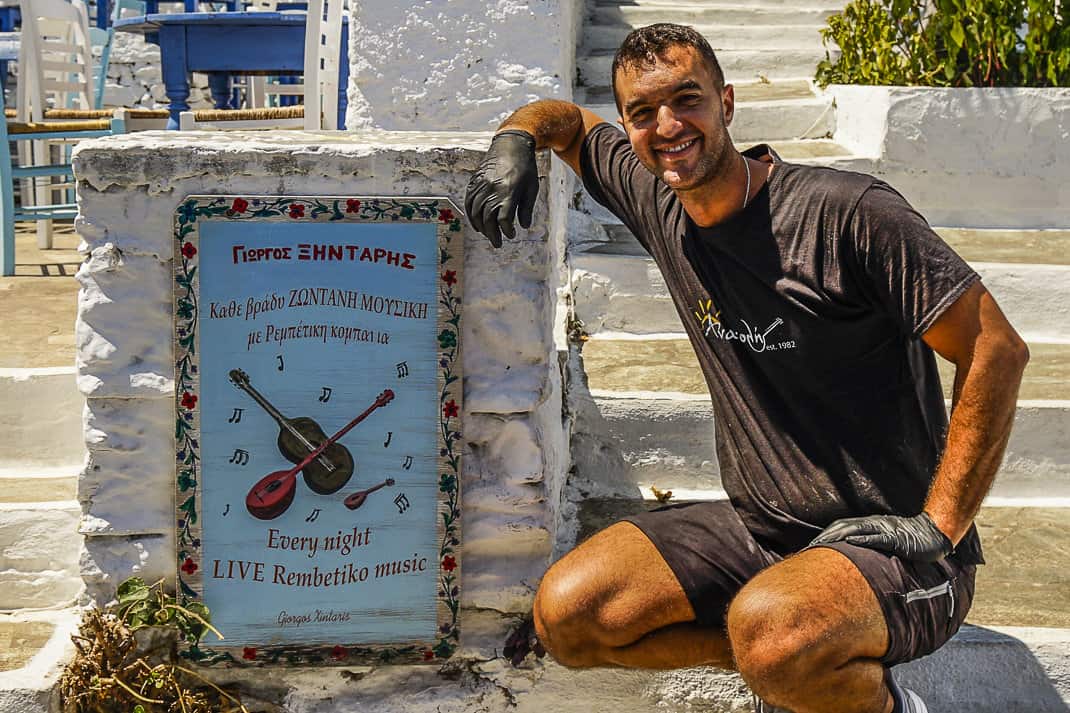
The history
If music is the best mirror of one’s heart, the Greeks had reason to pour out their hearts under the Ottomans which ruled Greece from 1422-1912. The Greeks suffered from tyranny, forced military conscription for 200 years and a loss of their culture. Following independence in 1924 came a Great Depression and a fight against Benito Mussolini’s Italian fascists.
During these sad times, Greeks would gather and sing about their woes. Often it would be from hash houses where they would smoke away their troubles.
“Most of the composers tried to picture in their songs the difficulties they had during the wars we had in Greece,” Theodore said. “That’s the main idea.”
During World War II, many songs and their depressing – and violent – lyrics were banned. After the war, rebetiko had a huge revival in the 1950s. Gone were tales of hashish and violence and poverty; in were songs of love and death and hope. Now, even Greece’s international star, George Dalaras, sings rebetiko on tour.
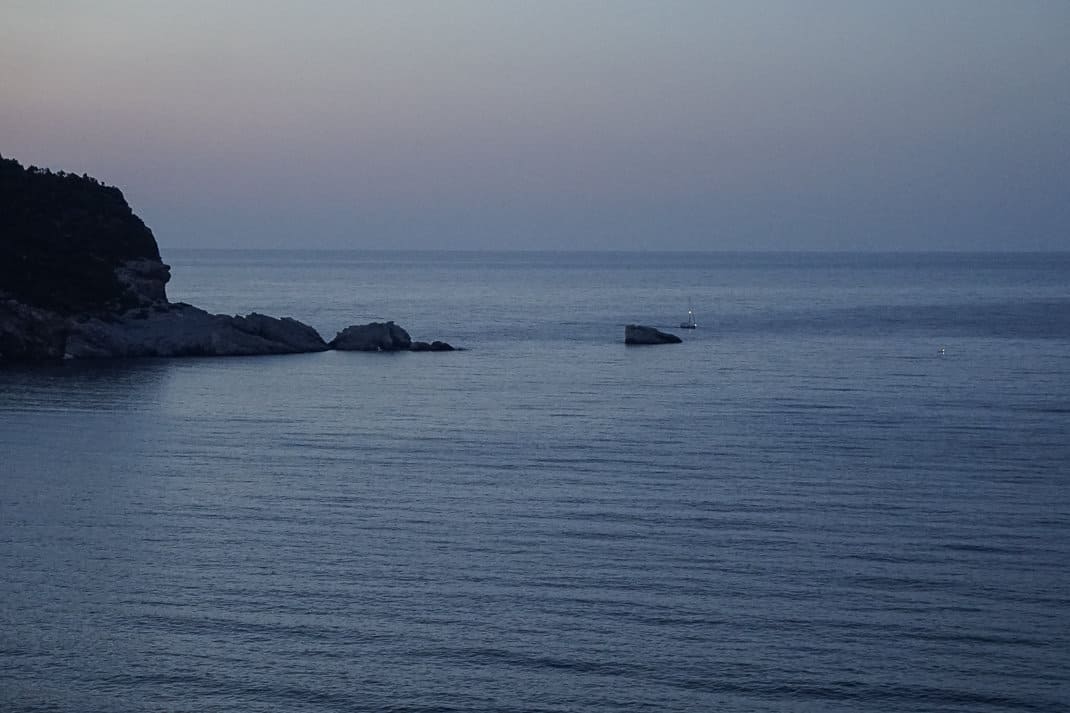
Besides, Greece is on a rebound. Remember, after the world financial crisis of 2007-08 this paradise of a country collapsed economically and became Europe’s homeless man, squatting on the corner of the continent, hat in hand. But after its third bailout in 2018, Greece is back on its feet. Unemployment has almost been cut in half, and this year economic growth should reach 4 percent. Tourism dollars will hit at least 90 percent of the pre-Covid levels that brought in €18 billion.
“We can not live through the (old) songs,” Theodore said. “We don’t have too much poverty now. We do have but we can relate to the songs about love. Actually, immigration right now is even better. All of those songs draw from an era that is long gone.”
Ouzeri Anatoli
Ouzeri Anatoli is a result of Giorgos’ Rebetiko prowess. As his brother and others prepared that night’s food in their tiny kitchen, Theodore explained how the restaurant began in 1982. It started with only seven or eight tables. Now it has 63.
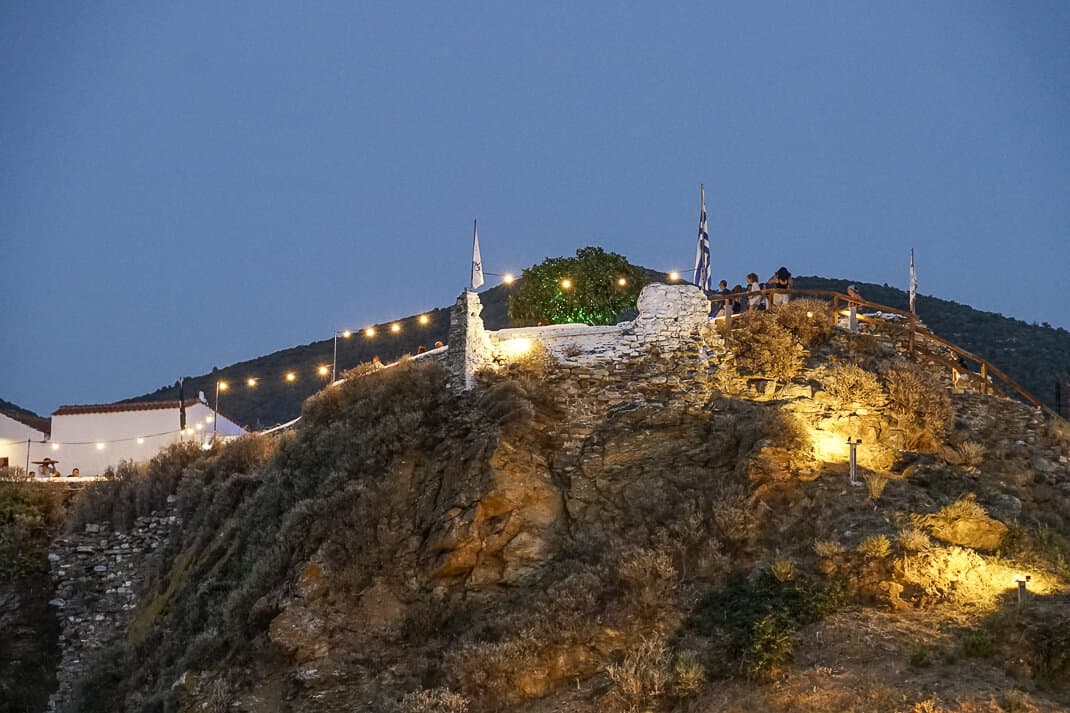
“It started when he was alone, not only in life but here he was also alone,” Theodore said. “He was playing. Inside he didn’t have the kitchen we have now. When he was playing, when the song was ending, he said, ‘Would you like something from the bar or kitchen?’ He’d go inside and grab some cheese or anchovies or octopus.
“He was a waiter between the songs. Then he went to play in order to enjoy the customers.”
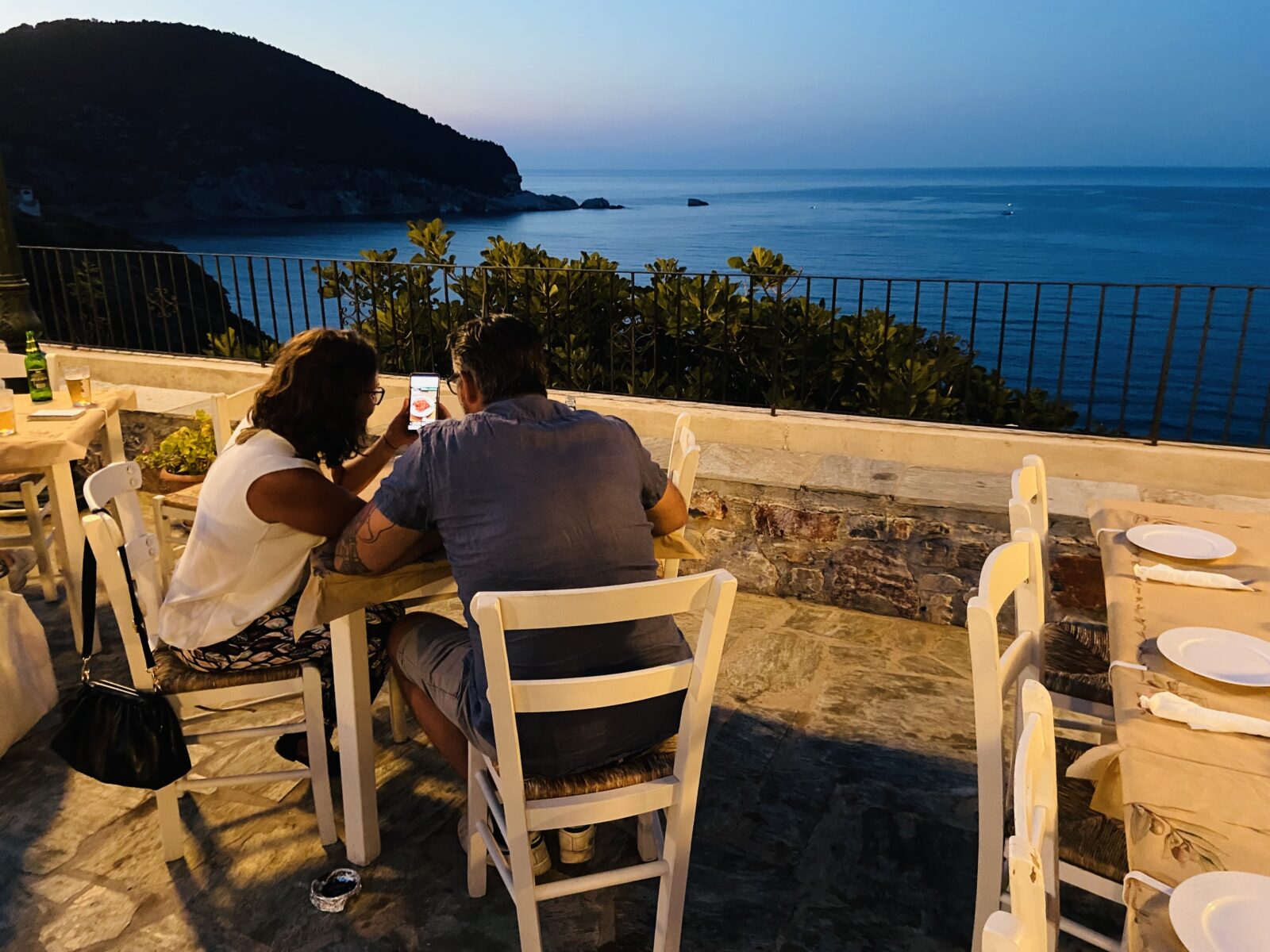
Marina and I returned that night for dinner and the show. I was already fat, happy and spoiled by Skopelos’ remarkable restaurants. Unwilling to climb the mountain of stairs from the harbor, our cabby took us to a street just below the restaurant. We stopped at Bar Thalassa, a sprawling outdoor bar where we drank ouzo and wine and watched nightfall descend on the sea.
We climbed some stairs to the restaurant to see Giorgos at a table with two friends, rubbing his rosary beads. Every table was filled, mostly with well-dressed Greeks in billowy shirts and sharp pantsuits. I ordered the shrimp with feta cheese and tomato sauce despite muttering to Marina that if I eat one more crumb of feta I’ll start quoting Aristotle.
The dish was scrumptious and I finished just as Thedore, Antonis and their friend,Giorgos Anagnostou, started playing. Symbolic of rebetiko is the bouzouki, a Greek guitar known for its distinct round body. Greek refugees brought it to Greece from Asia Minor in the early 1900s and today it has become even big in Greek pop music.
It’s a pleasant sound, very easy on the nerves and ears. While eating Greek food surrounded by Greece’s trademark blinding white walls and the Aegean Sea below, drinking ouzo, I felt like I was inside Greece’s soul.
Popular with the young
I’d read that the rebetiko revival from the 20th century continues today. It seems too slow, too old-fashioned maybe, to appeal to Greek youth. Yet I read it has even made inroads with them.
Our hotel manager at the superb Panormos Beach Hotel, is a hip, multi-lingual 36-year-old named Angelos Falkos. He told me he’s a huge fan.
After I returned home I wrote him with one question: Why?
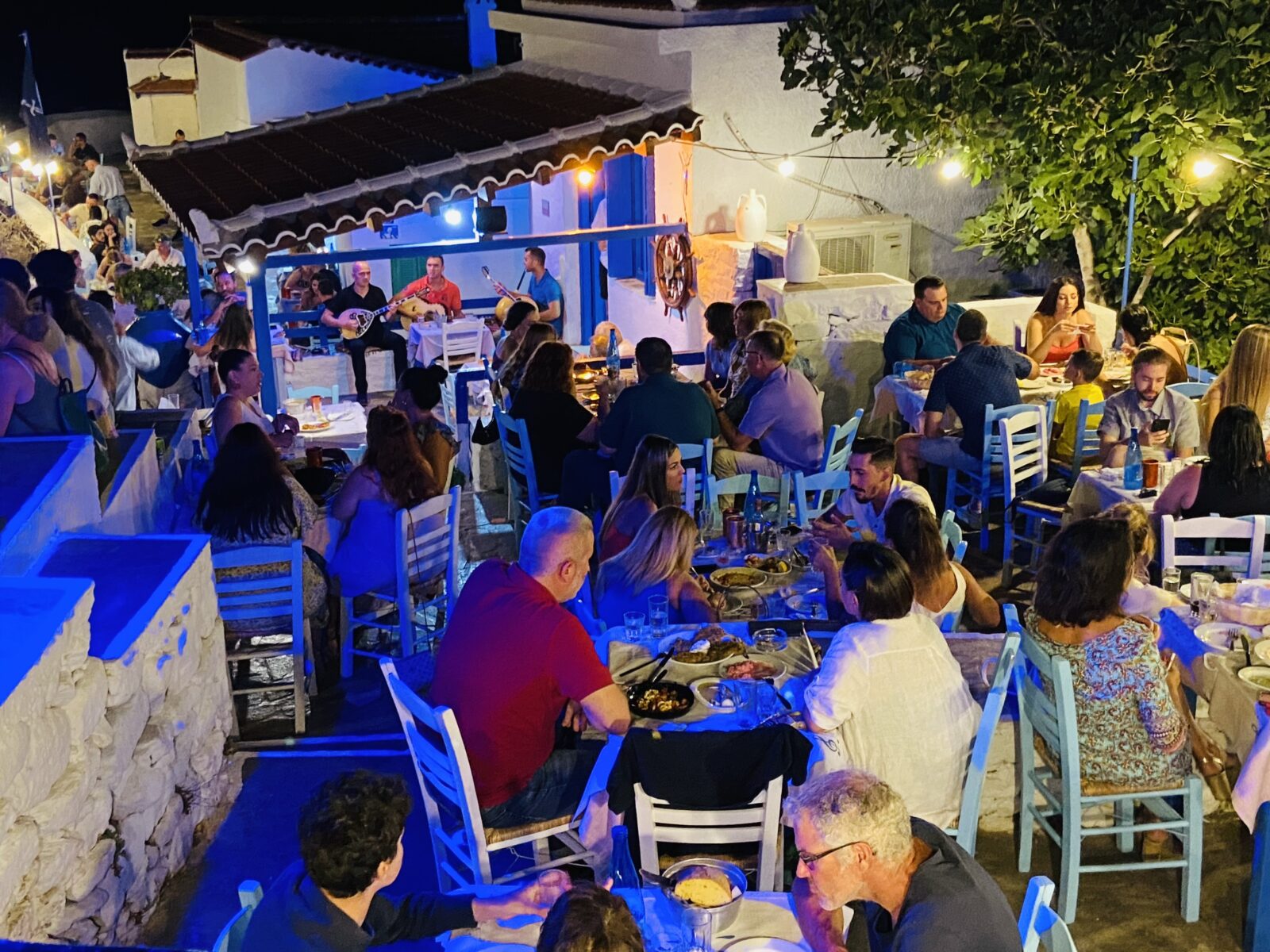
“It’s melodic with a sense of melancholy, performed in a rough mix of folk instruments,” he wrote in an email. “We could call rebetiko is a kind of Greek ‘hard rock’ of the past.”
I asked him what rebetiko has meant to him over the years.
“Rebetiko lyrics always find something into your soul to get a life,” he wrote. “When you listen to a rebetiko song you have the feeling that immediately speaks for you. The sound comes immediately to our ears when we have a view to our sea, to our cities, to our villages or even to our families when we miss them or the person we love.
“So rebetiko is the soundtrack of our lives!”
I didn’t buy a rebetiko tape as a souvenir. I came home with a delicious bottle of white Mantineia wine from Peloponnese. However, when I drink it, I may go to the Internet to find the Xintarises playing, about love and death and reminding me of an island paradise of which I long to return.
Do you want to go?
How do you get there? Skiathos has direct flights from Athens, Naples, Milan, Vienna, London, Bari and Bucharest. For the 45-minute round-trip flight from Athens I paid €175. From Skiathos airport, it’s a €10 taxi to the port where numerous ferry companies go to Skopelos. The 35-minute one-way journey is about €18.
Where do you stay? Panormos Beach Hotel, Panormos, 30-2424-022-711, Hotel | Panormos Beach Hotel Skopelos, info@panormosbeach.com, info@panormosbeach.com. Located a 30-minute, €20 taxi ride from Skopelos’ port, Panormos Beach isn’t just one of the best hotels on Skopelos. It’s one of the best hotels I’ve stayed in Europe. It features an infinity pool overlooking the sea. Poolside is where you have a huge buffet breakfast and a friendly beach bar open all day. Big rooms with balconies and a two-minute walk down the driveway to the beautiful – but rocky – beach across the street. (Non swimmers beware: The sea goes deep after about 20 feet.) I paid €945 for seven nights. The price drops in September.
Where do you eat? Ouzeri Anatoli, Skopelos Castle, Skopelos Town, 30-2424-022-851, 7:30 p.m.-2:30 a.m. Excellent local dishes in an open-air restaurant overlooking the Aegean Sea. The Xintarises play there every night. Reservations highly recommended.
When do you go? Ouzeri Anatoli is open from the end of May or the beginning of June to the middle of September. Avoid August. Greece is packed. Even little Skopelos was crowded.
More information: Holiday Islands, 30-2424-029-036, www.holidayislands.com, info@holidayislands.com. Travel agency on Skopelos specializes in accommodations in the Sporades Islands chain.


August 23, 2022 @ 3:13 pm
Thank you. You might like the book “Lament from Epirus” by Christopher King who chased all over Greece trying to trace the roots of the original Rebetiko musicians and the folk music behind it.
August 23, 2022 @ 3:13 pm
Thank you. You might like the book “Lament from Epirus” by Christopher King who chased all over Greece trying to trace the roots of the original Rebetiko musicians and the folk music behind it.
August 23, 2022 @ 10:06 pm
Did you miss the AS Roma game last night, I was there – good to be back in Monti good to be back in Rome. 🙂
August 24, 2022 @ 11:29 pm
Colosseum absolute shambles too many private tour guides and their disoriented drone tourists charging around the entry, corridors and blocking the stairwells. Buy your own ticket read up on the Colosseum and do it at your own pace. The Colosseum management should get this sorted before someone gets hurt.
September 5, 2022 @ 6:47 am
You incorrectly state that “ Rebetiko …dates back to the 15th century when Greece was part of the Ottoman Empire. ”
However, earliest recordings of Rempetiko date back to the END of the Ottoman period (the early 20th century) but there is some evidence that it may have begun some decades earlier (in the era before recordings were possible) but certainly NOT in the 15th century (during the Renaissance?!)
Rempetika is music historically of the earliest part of the 20th century i.e., from 1900.